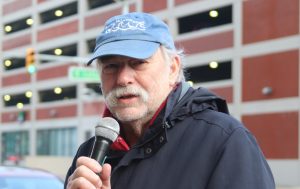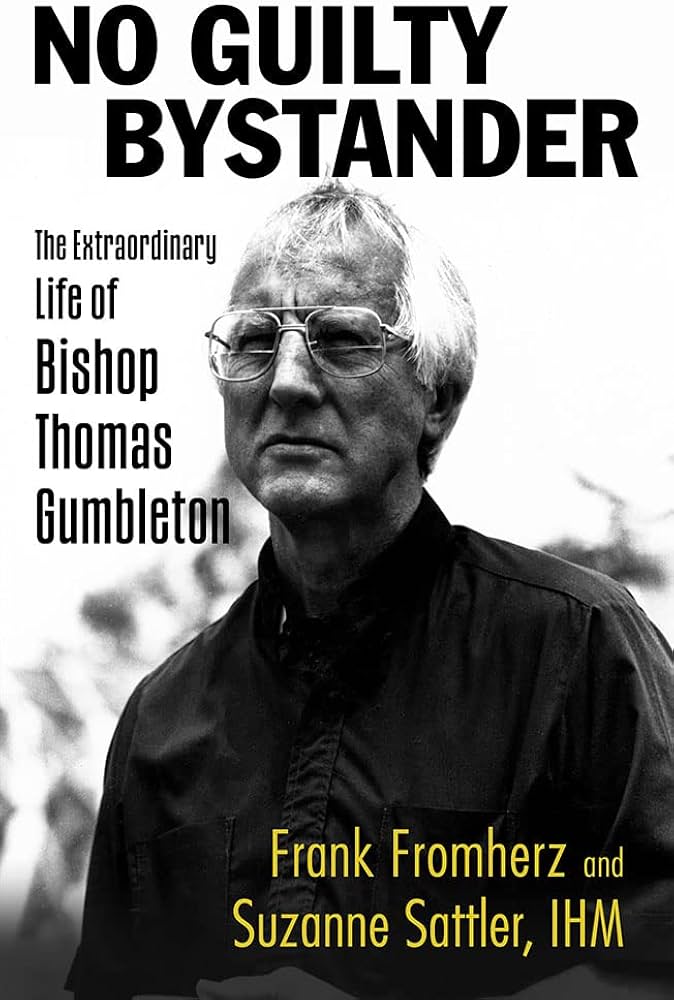In a fitting coincidence of gospel nonviolence, Detroit Catholic Bishop Thomas Gumbleton, 94, crossed over to God in fullness on April 4, 2024, the anniversary of the assassination of Martin Luther King Jr. Here was a saintly providence, calling us to consider his good life.
Toward the beginning of this biography, Tom Gumbleton tells of receiving a handwritten note from Daniel Berrigan in Danbury Prison. He had followed Dan and the Catonsville Nine, who had burned draft files in protest of the U.S. war in Vietnam, for which they were subsequently tried and imprisoned. At the time, Gumbleton’s conversion to nonviolence and war resistance was well under way. And he’d even met with some success at pushing the National Conference of Catholic Bishops (NCCB) to oppose the War. So, he was “stunned and hurt” to receive this letter “in which he expressed anger and frustration that I had not joined in any actions of civil disobedience.” Tom set it aside without reply, but eventually reflected, “I came to realize that it was genuinely out of deep convictions and his regard for me that he would even bother to write, and to write honestly…His letter was in fact a real grace to which I was invited to respond.”
Another letter. Three decades later. His brother writes to his family, coming out as gay. Neither does Tom want to hear this and throws the letter to the floor. But yet again, he pauses, listens, reflects, receives. It ends up opening a whole new ministry of pastoral care. He presses these issues with NCCB and drafts their Always our Children booklet for parents of gay folk. Though it’s rare to see him in a miter (a bishop’s characteristic headdress), he processes in Minneapolis wearing one adorned in rainbow colors and a cross with a pink triangle, presaging the active compassion of Pope Francis.
These stories are emblematic. They evince a gift of listening which runs throughout this life, signaling his constant openness to conversion, to a change of heart and mind. Moreover, a kind of inside-outside churchly movement is suggested.
This project was begun by Frank Fromherz, a biographer with archival experience, but then joined by Detroiter Sue Sattler, IHM with more intimate knowledge of Tom in their shared work on the ground. It’s an inside-outside literary team-up of their own.
Gumbleton was consecrated bishop a year after the ‘67 Detroit rebellion. A short film about him, American Prophet, captures the moment with a backstory about his aggressive hockey-playing crew.
No Guilty Bystander is structured as a series of biographical narratives around particularly poignant moments in American history. Featured are Vietnam, nonviolence, a visit to the Iran hostages, the bishops and the bomb, ministry to the gay community, Central American accompaniment, Iraq – 9/11, Haiti, an urban pastorate, and clergy sexual abuse – all in all an extraordinary sequence. What can get lost is the overlap and simultaneity. I wished sometimes for a detailed chronology simply for connection and context.
I first met Gumbleton in the early ‘80s through the plexiglass at Oakland County Jail. He visited a group of us which included women religious and priests who had blocked the gates of Williams International, the cruise missile maker. When a subsequent case went to the Michigan Supreme Court because we were being held on civil contempt (an open-ended sentence “until we promised not to return”) he joined in filing an Amicus brief. It cited a second-century correspondence with the Roman Emperor Trajan concerning his sentencing policy for believers refusing to worship Caesar – that seminal act of Christian conscience.
Gumbleton’s own first arrest was stepping across a line in the Nevada desert in 1987. It was a large action called by him through Pax Christi, which he’d founded, and “was the first time Catholic bishops had been arrested at the Nevada Test Site or any other protest of United States nuclear policy…” For him the first of a dozen such.
As auxiliary bishop, he was known best through church visitations and baptisms. Tom confirmed the children of the Day House Catholic Worker community. My daughter Lydia sometimes claims to have been simultaneously baptized Methodist, Catholic, and Episcopal because on that occasion bishops from each tradition were present to her and the waters.
The assassination of Bishop Oscar Romero woke Tom Gumbleton to the suffering of Salvadoran people, but it was women who led him into the work. Speaking about the gospel call to nonviolence at a program for Maryknoll’s missionaries, he met Ursuline Sr. Dorothy Kazel. A long ongoing conversation followed. Then December 2, 1980, along with three co-workers, she was raped and murdered by a paramilitary squad (three of whom were trained at the SOA). He attended her memorial mass in Cleveland. Things were suddenly personal and close to home.
A year hence, Eileen Purcell invited Tom into the sanctuary movement. He was the first bishop to call diocesan churches to become sanctuary communities. St Rita’s parish followed, along with the Detroit Refugee Coalition at St Peter’s Episcopal. Next came accompaniment work in El Salvador with Sue Sattler joining, an eye-witness fellow traveler. Along the way were airport detentions, a delegation walking arm-in-arm through a military blockade, fasting, tax resistance, White House arrests, and a debate with Elliot Abrams of Reagan’s State Department (I actually remember it) on PBS. As our authors put it: “In El Salvador the people say that Oscar Romero has an address in Detroit, and that is Tom Gumbleton.”
In Detroit there were several waves of church closings dictated entirely from above. Gumbleton was sometimes sent as the messenger of bad news. So. The way I heard it from him, he was in such a conversation with a parish, even explaining to the struggling congregation the shortage of priests faced in the diocese. They looked him in the eye and replied, “You be our priest.” Drawn up short, he listened.
For a quarter century thereafter, Gumbleton’s address in Detroit was St. Leo’s Church. He moved not into the rectory, but into an old boiler house. His desk was the nightstand, an air mattress his bed. When Tom was broken into repeatedly, his pastoral associate noticed, “He never showed fear. I think he believed the Lord was taking care of him.”
Here was his urban apostolate. A community development wing built and rehabbed homes down the street. When another wave of church closings was announced, so extensive City Council called a hearing on it, Tom testified and later reflected, “In spite of our rhetoric of wanting to be a church of the poor, the poor are easily forgotten if they aren’t part of your congregation. We’ve seen the archdiocese close churches, saying, ‘Well, our people have left’ – as though there are not people here.”
Meanwhile the parish came alive. Its school flourished modestly. A soup kitchen served 300 guests each day, street folk who knew their bishop personally. Tom would offer to host a lunch meeting for Michigan Coalition for Human Rights, which he co-founded, and then line the board up for hot soup, coffee, and day-old bread. A vocation of hospitality meant the church became a meeting place for local and national justice gatherings. His homilies, published weekly by the National Catholic Reporter, had a wide reach, but he often preached them with his bags packed for a trip to speak (or listen) elsewhere. He taught in a city-wide Ministers of Service Training program for poor and Black congregants without college degrees. They’d become prison visitors, soup kitchen workers – or in some parishes, women serving at the altar.
All this coincided with the Iraq and Afghan wars. When Iraq invaded Kuwait in 1990, Tom’s bags were packed and he went to Baghdad to visit foreign nationals held hostage by Saddam Hussien. But on MLK’s birthday that January, the U.S. began a reign of bombing. In two months, “the United States conducted 110,000 aerial sorties over Iraq, unleashing…the equivalent of seven and a half Hiroshima bombs. Nearly every facility vital to civilian life became a target. Over 150,000 defenseless people died.” All too familiar.
Gumbleton began a three-week public fast; fifteen bishops joined him. Then in May he organized a large delegation, including many Detroiters, carrying medical aid in defiance of the legalized sanctions. This was not only direct action, but civil disobedience as they were threatened with twelve years imprisonment.
All of this was intuitive personalism. Drawn by relationships into direct service, he’d end up addressing the policy and structural issues via movement struggle. All stemmed from his gift of listening.
In 2007 Gumbleton was forced out of St. Leo’s and also out of his office as bishop, essentially by Pope Benedict. Barbara Blaine, a victim of sexual abuse by her priest from the age of thirteen, organized a Survivors Network and through it Gumbleton pastored many survivors. Eventually, she asked if he would testify to the Ohio State Legislature then considering an extension of the statute of limitations on sexual abuse. In a press statement, he acknowledged for the first time that he himself had been subjected to abuse as a fifteen-year-old seminarian. He neglected to notify the Ohio bishops in advance, certain they would forbid it. In consequence he was forced out. Moving into an apartment two blocks from my church, St. Peter’s Episcopal, he sent a lovely note saying he was living in my parish.
The typical expectation of an auxiliary bishop would to be eventually to be made an “ordinary” over a diocese. Gumbleton defied that expectation remaining perpetually auxiliary. Politics likely kept him there, but also his willingness, even choice. As auxiliary he still exercised great influence within the Conference of Bishops, but also enormous freedom. If it made him a bishop of the margins, it also afforded a base for his flurry of pastoral and movement work. Fromherz and Sattler may be making a wry ecclesiastical pun in their subtitle: The Extra-ordinary Life of Thomas Gumbleton. And it was. We owe them gratitude for this labor of love in bringing his life into the fullness of light.

Bill Wylie-Kellermann is a nonviolent community activist, author, teacher, and retired United Methodist pastor, most recently serving St. Peter’s Episcopal Church in Detroit.
A native Detroiter with a place-based vocation, he was a member of the Homich 9, a group prosecuted for blocking water shut-off trucks in the Detroit Water Struggle, and a direct action point person for the Michigan Poor Peoples campaign.


